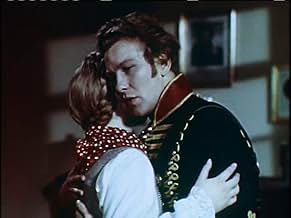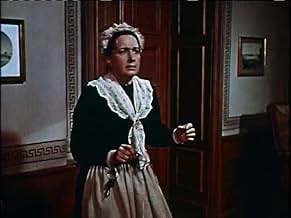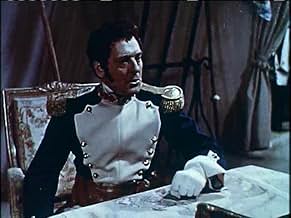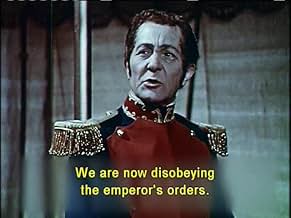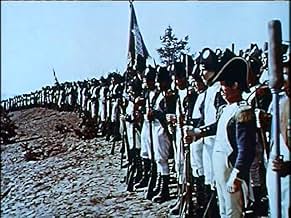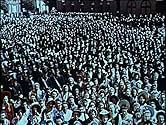Füge eine Handlung in deiner Sprache hinzuDuring Napoleon's German campaign, the city of Kolberg is isolated from Prussian forces. Residents organize resistance against the French army besieging and bombarding the city, refusing to ... Alles lesenDuring Napoleon's German campaign, the city of Kolberg is isolated from Prussian forces. Residents organize resistance against the French army besieging and bombarding the city, refusing to surrender.During Napoleon's German campaign, the city of Kolberg is isolated from Prussian forces. Residents organize resistance against the French army besieging and bombarding the city, refusing to surrender.
- Zaufke
- (as H.H. Schaufuss)
- Fanselow
- (as F. Schafheitlin)
- französischer Offizier
- (as St. Germain)
Empfohlene Bewertungen
Then, Kolberg hadn't fallen when this film premiered in Berlin and La Rochelle (which, perhaps inspired by the film, capitulated only two days after Germany had fallen). Kolberg was finally abandoned on March, 18.
There is a beautiful restored print sold by the International Historic Films. It has beautiful colours and a good soundtrack, plus some extras. This film can be watched - and indeed enjoyed - as a work of art, unless you absolutely want to read propaganda into it. Sure, it was made as an ultimate propaganda vehicle, but as a viewer I am permitted to distance myself from the politics and see this film as a cinematic near masterpiece. We know, that it was radically edited in January 1945, since Dr Goebbels found it to be too bloody, "nearly pacifistic". Every trace of human suffering (aside from the lame love intrigue) was removed, and that's probably what makes this film uneven and jumpy at times. What the director's cut could have looked like, we can only guess.
Politics and propaganda are as important today as they were back then. It's important to remember the atrocities of war and the crimes of Nazist regime. But a film starts living its own life since the moment it's completed, and we are stupid if we fail to recognize its merits merely because we know, that we are supposed to be blind to them.
The story of the movie is not all that important... What matters is the great heinrich george, the rich colours, the hateful atmosphere of the movie - and the tragedy of reality as a background: Shortly after the making of "kolberg" was finished, germany was finished either:
The movie has a romantic perspective on a reactionary, aggressive, irrational and leader-oriented ideology... Not too far away from John Wayne, though I find him very entertaining as a green beret, either.
The film is an awesome piece of spectacle especially when you consider the money spent and the manpower appropriated from the battlefield by Dr. Goebbels to be extras, playing being French and Prussian soldiers for the camera and missing the real war where doubtless a lot of them would be killed. I wouldn't be surprised if a lot of candles were lit for Goebbels in many German households today because of it.
The story is after Austerlitz Napoleon pretty much had the run of things in Europe for a while. In his march toward Russia he met this incredible resistance from the former Hanseatic League town of Kolberg. Inspired by its mayor played by Heinrich George and Horst Caspar as General Gneissenau the place held out against incredible odds until the Treaty of Tilsit was signed, one of the few places in the future united Germany to do so. A whole lot like the way the City of Leningrad held out for years against the Nazis invading though that was a comparison the Third Reich would not be making.
George who was a favorite and favored player during the Third Reich is brilliant as Mayor Joachim Nettelbrick who spent as much time battling with Paul Wegener as the first commandant of the garrison as with the French. I had to think about that one for a bit, but it occurred to me that Hitler would probably have liked the citizen mayor showing up the professional army man as George continually does. After he was just a corporal and had conquered most of Europe against the advice of most of his generals. Of course then Gneissenau who is an ideal Aryan teams up with the mayor and they triumph.
The battle scenes populated with extras who were thanking whatever Gods they worshiped that they were not in the real war only miles away are staged brilliantly. The message of Kolberg is resistance and none of the other Nazi prejudices made its way into the film.
Veit Harlan one of the Third Reich's favored directors brought this one in which in Hollywood would have had the studio bean counters tearing the hair out of their heads. Krista Soderbaum who was the symbol of blond Aryan womanhood and Harlan's wife is also in the film who sustains several tragic losses, but carries on.
In a booklet that accompanied the DVD of Kolberg I ordered it pointed out the film did not have quite the impact that Goebbels thought it would after its Berlin premiere on January 30, 1945. First of all it had limited bookings because 90% of the theaters in Germany had been destroyed by Allied bombings. And by the time it came out the people were really not responding too well to the Propaganda Ministry's pablum.
I have to say that this last film from Goebbels is brilliantly conceived and executed. But after World War II Kolberg became and remains part of Poland with its German population expelled or worse by the Russian Army and Polish resistance. So what was it all about?
That aside, 'Kolberg' is a marvellous piece of film-making. Beautifully shot in Agfacolor by Bruno Mondi with a powerful score by Norbert Schultze and intensely moving performances by some of Germany's finest.
The three leading characters of Gniesenau, Nettlebeck and Maria are basically symbols, respectively, of inspired military leadership, nationalist fervour and supreme sacrifice. Indeed, Gniesenaus' 'The people rise...the storm breaks' echos Goebbel's 'total war' speech from 1943.
Whatever one's feelings regarding demonised director Veit Harlan and the monstrous masters he served this film nonetheless remains an essential piece of cinematic history which no true cinephile can dismiss.
Wusstest du schon
- WissenswertesFeatured 15,000 to 20,000 actual German troops in the battle scenes, even as Germany's eastern and western fronts were collapsing. The director tried to make the shooting longer to save them from being sent to the front.
- PatzerSaxony didn't separate itself from the Holy Roman Empire. It was separated after the Rheinbund was founded in 1806, to which Saxony was included later. Also, in the movie the inclusion of Saxony is mentioned by King Franz II. In real life it didn't happen until December, almost four months after Franz's resignation.
- Zitate
Bürgermeister Nettelbeck: [after Gneisenau asks Nettelbeck to surrender] You weren't born in Kolberg, Gneisenau. You are put here to Kolberg. But we grew up here. We know every stone, every corner every house here. We don't let go. Even if we have to claw in the ground of our city with our nails, we don't let go. First they have to cut off each of our hands or kill us one after the other. Gneisenau, you can't put the whole disgrace on an old man like me. and to give our city to Napoleon. I even promised our king: rather be buried below the ruins that capitulate. Gneisenau, Gneisenau, I never stand on my knees for anyone, now i'm doing it: Kolberg can't be given up, Gneisenau!
Gen. Gneisenau: That's what I wanted to hear from you, Nettelbeck. Now we can die together.
- VerbindungenEdited into 30. Januar 1945 (1965)
- SoundtracksEin Volk steht auf
Top-Auswahl
- How long is Burning Hearts?Powered by Alexa
Details
Box Office
- Budget
- 8.800.000 DM (geschätzt)
- Laufzeit
- 1 Std. 51 Min.(111 min)
- Sound-Mix
- Seitenverhältnis
- 1.37 : 1

